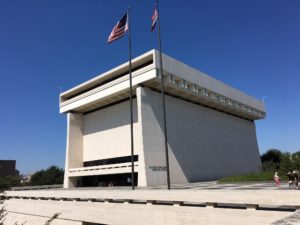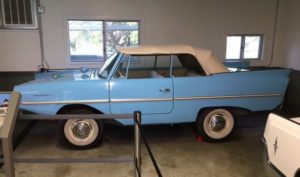
The mausoleum-like LBJ library.
No trip to Austin would be complete without a trip to the Lyndon B. Johnson presidential library. The edifice, designed in a late 60s-era brutalist style of architecture, is massive, impersonal and expresses nothing of the man it honors. But the museum inside brings to life a president who, for all his failings, was one of the most consequential in the history of the United States.
LBJ advanced the Civil Rights revolution, stripping away the trappings of Jim Crow and setting up laws to ensure equal civil rights for all Americans regardless of race, and he embarked upon one of the greatest social experiments ever — the war on poverty. He also presided over the quagmire that was the Vietnam War. The first accomplishment was brilliant, and it will enshrine Johnson forever in the pantheon of great American presidents. The second was noble in spirit and aspiration, but it suffered from massive unintended consequences and, far from vanquishing poverty, has cemented it in place. The Vietnam war was tragic, although I do believe future historians who write the second draft of history may be more forgiving of Johnson than those who lived through that tumultuous time and articulated the conventional wisdom that dominates the way Americans view the conflict today.
I grew up in a Republican household, and my parents were never fans of LBJ. As a fifth grader, I sported an AuH20 button. I still hew to Goldwater’s libertarian philosophy and I lament the massive expansion of federal government power that Johnson presided over. But with the passage of time, I have become more appreciative of his accomplishments. The visit to his library, which put some of his most uplifting oratory on display, gave me a deeper insight into his thinking. Born into a modestly well-to-do family in the hard-scrabble hill country of Texas, he lived close to the poverty of those around him. While rising to wealth and prominence (the LBJ library does not dwell upon the more unsavory details of where that wealth came from), he never forgot the less fortunate members of society.

The LBJ archives
The LBJ era also ushered in the era of ultra-rancorous politics we know today. The media skewered the president over his Vietnam War policies. As he complained in a Trump-like lament, if he had walked on water across the Potomac River, the headline the next day would be, “Johnson can’t swim!”
Precursors of today’s Daily Show and other politically charged late-night “comedy” acts were “Rowan and Martin’s Laugh-In” and the “Smothers Brothers Comedy Hour.” Tom and Dick Smothers were particularly tough on the president, although the tone of relentless negativity never approached what we see on “comedy” shows today. As a youth who watched both shows, I don’t recall anyone suggesting that President Johnson’s mouth would best serve as Khrushchev’s cock holster. The item on display in the museum that left the most enduring image in my mind was a letter signed by Tom and Dick Smothers:
Mr. President,
During the past couple of years we have taken satirical jabs at you and more than occasionally overstepped our bounds. We disregarded the respect due the office and the tremendous burden of running the country because of our emotional feelings towards the war. …
Often, an emotional issue such as war makes people tend to over-react. Please accept our apology on behalf of the Smothers Brothers Comedy Hour for our over-reaction in some instances. Please know that we do admire what you have done for the country and particularly your dignity in accepting the abuse of so many people.
In the 1960s, emotions ran high because of war, the civil rights struggle, riots in the streets, and a counter-cultural revolution that rejected long-established norms. There were weighty reasons for anger. Yet both Johnson — a man so uncouth he installed a telephone in his bathroom so he could conduct affairs of state while sitting on the toilet — and his antagonists conducted themselves with far greater dignity than their counterparts today when the stakes are…. what? Really, what issue is doing more to tear tearing the nation apart than the mutual loathing of our president and his enemies?

The LBJ ranch
Speaking of the toilet installed in LBJ’s bathroom… we saw it. After visiting the LBJ museum, we decided to tour the LBJ ranch, known as the Texas White House, where Johnson spent 450 days during his five years in office. The ranch house, located about 45 minutes west of Austin, faces the Pedernales River, very near where Johnson was born and spent his early youth. A utilitarian building, by no means opulent, the house befits a man who had few social pretensions. The furnishings, preserved as if in amber, are a testimony to 1960s taste and culture. (Ewww.)
Johnson made the most of every minute of every day. He didn’t work out. He didn’t didn’t play golf. He didn’t hobnob with the beautiful people. Politics consumed his every thought, and he outfitted his house with televisions in every room — three of them, one for each network, in his bedroom — and always had a telephone within reach. Including one near his toilet. Johnson was always reaching out: negotiating, flattering, threatening, and cajoling to move his agenda forward. One day he reputedly spent a full 18 hours on the telephone. It’s how he got so much accomplished. It certainly worked better than tweeting.

The amphibcar
Johnson loved being around people, and he had a zest for life. One of his favorite tricks was loading newcomers to the ranch into the blue car at right, crying out that the brakes had failed, and plunging into a lake. Unbeknownst to the passenger, the car was one of 3,900 amphibious Amphicars manufactured by a German company. In an audiotape one can hear at the ranch, then-presidential aide (and future cabinet secretary) Joseph Califano described his terror until he realized that the car was not sinking.
LBJ, bigger than life, truly was a president that only Texas could have produced.


